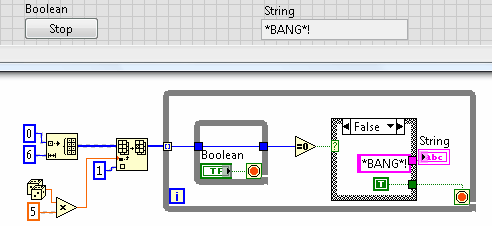32
4
Let's play Russian Roulette!
Normally, this would be a race to write the shortest MOD 6 program, but that's not very realistic, as the chance of winning decreases with each click. Here are the rules:
- Emulate a real six-shooter:
- A single bullet is placed into one of the six chambers, and the barrel is spun once, only before playing.
- The chance of losing on the nth try is 1/6.
- The chance of losing after n tries is 1/(6-n)
- You are guaranteed to lose in, at most, 6 tries.
- Losing:
- Display the text
*BANG!* - Terminate the program.
- Display the text
- Winning:
- "Winning" means the gun does not fire, but the bullet is one chamber closer to the hammer.
- Display the text
*click* - Present a "trigger" to the user, along with the ability to terminate the program (e.g. "ctrl+c", see below).
- Program specific:
- Pulling the trigger is some form of user input, including the first try. (This can be a keystroke, a mouse click, whatever; text prompts are not required.)
- Only one instance of the program is allowed until it is terminated. (Running a new instance of the program is akin to giving the barrel a good spin, i.e. the probability of losing on the next click is reset to 1/6.)
Shortest code wins!
Leaderboard
<style>body { text-align: left !important} #answer-list { padding: 10px; width: 290px; float: left; } #language-list { padding: 10px; width: 290px; float: left; } table thead { font-weight: bold; } table td { padding: 5px; }</style><script src="https://ajax.googleapis.com/ajax/libs/jquery/2.1.1/jquery.min.js"></script> <link rel="stylesheet" type="text/css" href="//cdn.sstatic.net/codegolf/all.css?v=83c949450c8b"> <div id="language-list"> <h2>Shortest Solution by Language</h2> <table class="language-list"> <thead> <tr><td>Language</td><td>User</td><td>Score</td></tr> </thead> <tbody id="languages"> </tbody> </table> </div> <div id="answer-list"> <h2>Leaderboard</h2> <table class="answer-list"> <thead> <tr><td></td><td>Author</td><td>Language</td><td>Size</td></tr> </thead> <tbody id="answers"> </tbody> </table> </div> <table style="display: none"> <tbody id="answer-template"> <tr><td>{{PLACE}}</td><td>{{NAME}}</td><td>{{LANGUAGE}}</td><td>{{SIZE}}</td><td><a href="{{LINK}}">Link</a></td></tr> </tbody> </table> <table style="display: none"> <tbody id="language-template"> <tr><td>{{LANGUAGE}}</td><td>{{NAME}}</td><td>{{SIZE}}</td><td><a href="{{LINK}}">Link</a></td></tr> </tbody> </table><script>var QUESTION_ID = 66763; var ANSWER_FILTER = "!t)IWYnsLAZle2tQ3KqrVveCRJfxcRLe"; var COMMENT_FILTER = "!)Q2B_A2kjfAiU78X(md6BoYk"; var OVERRIDE_USER = 38512; var answers = [], answers_hash, answer_ids, answer_page = 1, more_answers = true, comment_page; function answersUrl(index) { return "https://api.stackexchange.com/2.2/questions/" + QUESTION_ID + "/answers?page=" + index + "&pagesize=100&order=desc&sort=creation&site=codegolf&filter=" + ANSWER_FILTER; } function commentUrl(index, answers) { return "https://api.stackexchange.com/2.2/answers/" + answers.join(';') + "/comments?page=" + index + "&pagesize=100&order=desc&sort=creation&site=codegolf&filter=" + COMMENT_FILTER; } function getAnswers() { jQuery.ajax({ url: answersUrl(answer_page++), method: "get", dataType: "jsonp", crossDomain: true, success: function (data) { answers.push.apply(answers, data.items); answers_hash = []; answer_ids = []; data.items.forEach(function(a) { a.comments = []; var id = +a.share_link.match(/\d+/); answer_ids.push(id); answers_hash[id] = a; }); if (!data.has_more) more_answers = false; comment_page = 1; getComments(); } }); } function getComments() { jQuery.ajax({ url: commentUrl(comment_page++, answer_ids), method: "get", dataType: "jsonp", crossDomain: true, success: function (data) { data.items.forEach(function(c) { if (c.owner.user_id === OVERRIDE_USER) answers_hash[c.post_id].comments.push(c); }); if (data.has_more) getComments(); else if (more_answers) getAnswers(); else process(); } }); } getAnswers(); var SCORE_REG = /<h\d>\s*([^\n,<]*(?:<(?:[^\n>]*>[^\n<]*<\/[^\n>]*>)[^\n,<]*)*),.*?(\d+)(?=[^\n\d<>]*(?:<(?:s>[^\n<>]*<\/s>|[^\n<>]+>)[^\n\d<>]*)*<\/h\d>)/; var OVERRIDE_REG = /^Override\s*header:\s*/i; function getAuthorName(a) { return a.owner.display_name; } function process() { var valid = []; answers.forEach(function(a) { var body = a.body; a.comments.forEach(function(c) { if(OVERRIDE_REG.test(c.body)) body = '<h1>' + c.body.replace(OVERRIDE_REG, '') + '</h1>'; }); var match = body.match(SCORE_REG); if (match) valid.push({ user: getAuthorName(a), size: +match[2], language: match[1], link: a.share_link, }); else console.log(body); }); valid.sort(function (a, b) { var aB = a.size, bB = b.size; return aB - bB }); var languages = {}; var place = 1; var lastSize = null; var lastPlace = 1; valid.forEach(function (a) { if (a.size != lastSize) lastPlace = place; lastSize = a.size; ++place; var answer = jQuery("#answer-template").html(); answer = answer.replace("{{PLACE}}", lastPlace + ".") .replace("{{NAME}}", a.user) .replace("{{LANGUAGE}}", a.language) .replace("{{SIZE}}", a.size) .replace("{{LINK}}", a.link); answer = jQuery(answer); jQuery("#answers").append(answer); var lang = a.language; lang = jQuery('<a>'+lang+'</a>').text(); languages[lang] = languages[lang] || {lang: a.language, lang_raw: lang.toLowerCase(), user: a.user, size: a.size, link: a.link}; }); var langs = []; for (var lang in languages) if (languages.hasOwnProperty(lang)) langs.push(languages[lang]); langs.sort(function (a, b) { if (a.lang_raw > b.lang_raw) return 1; if (a.lang_raw < b.lang_raw) return -1; return 0; }); for (var i = 0; i < langs.length; ++i) { var language = jQuery("#language-template").html(); var lang = langs[i]; language = language.replace("{{LANGUAGE}}", lang.lang) .replace("{{NAME}}", lang.user) .replace("{{SIZE}}", lang.size) .replace("{{LINK}}", lang.link); language = jQuery(language); jQuery("#languages").append(language); } }</script>
I'm unclear on the probabilities. Is the loss time uniformly distributed between 1 and 6? – xnor – 2015-12-16T09:39:13.410
@xnor The probability of losing on the nth try is 1/6 - however, the probability of losing after n tries is 1/(6-n), since the probability of firing a bullet reaches one as the number of remaining empty chambers reaches zero. – ayane – 2015-12-16T10:02:00.253
This is very hard to do nondeterministically, I find. – cat – 2015-12-16T14:01:11.737
3Your assumptions are wrong - the chance of losing on the n'th try is only ⅙ if you respin the bullets after each shot. Without respinning the chance of losing is ⅙ on the first shot, ⅕ on the second, ¼ on the third... ending in 1 on the 6th. You recognise this with "You are guaranteed to lose in, at most, 6 tries". – rhialto – 2015-12-16T21:52:15.090
2@user2956063 you are forgetting that there is a (n-1)/6 chance that you never reach the n:th try, and thus cannot lose. They balance out to a uniform 1/6. – Jacob Raihle – 2015-12-17T10:26:00.737
2maybe that's a difference in the way computer scientists and statisticians express probability then - to me "The chance of losing on the nth try is ⅙" say's it's constant - whether n is 1 or 100. – rhialto – 2015-12-17T11:53:28.270
3Why was this not titled "Russian Roulette, Reloaded"? – Hand-E-Food – 2015-12-18T04:51:35.023
@Hand-E-Food Because I'm not very creative, especially with titles :P – ayane – 2015-12-18T05:19:35.797
I posted my answer several hours ago and I only just got the title now. well done (or I might just be stupid—that's never outside of the realm of possibility) – Cyoce – 2015-12-18T08:38:32.377
1@user2956063: Your probabilities are conditional. P(lose on shot 2) = ⅙, but P(lose on shot 2 | didn't lose on shot 1) = ⅕. Also,
nis (implicitly, I'll grant you) limited to [1,6], so 100 is out. – Tim Pederick – 2015-12-19T05:04:41.680